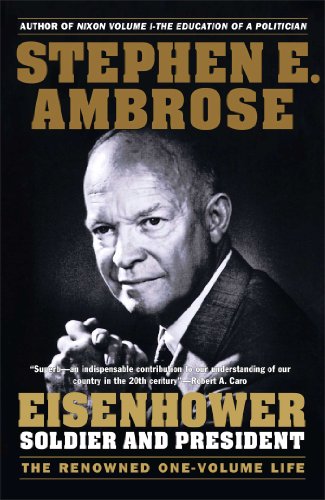During my recent trip to Asia, I was able to read Eisenhower: Soldier and President by Stephen E. Ambrose. Dwight Eisenhower was the first president I reme mber, and the only presidential library I ever visited. His presidency is easy to overlook, coming between Franklin Delano Roosevelt and Harry Truman on one side and John Kennedy and Lyndon Johnson on the other. Contemporaries seem to remember him for his war record more than his presidency. Yet he did lead the country at a pivotal time in the Cold War.
mber, and the only presidential library I ever visited. His presidency is easy to overlook, coming between Franklin Delano Roosevelt and Harry Truman on one side and John Kennedy and Lyndon Johnson on the other. Contemporaries seem to remember him for his war record more than his presidency. Yet he did lead the country at a pivotal time in the Cold War.
Dwight David Eisenhower was born October 14, 1890 in Abilene, Kansas, to David and Ida Stover Eisenhower, who as fundamentalist Mennonites were pacifists. He was the third of six sons, and this biggest challenge as a youth was controlling his temper. He was both good at sports and an excellent student with an interest in military history. He survived a major health challenge at age 14 when an uncontrolled infection from a scraped knee sent him into a coma. Doctors wanted to amputate his leg, but he adamantly refused and his family supported his decision. Somehow he recovered.
Eisenhower’s first choice for college was Michigan because he wanted to play football and baseball. But a friend talked him into taking the competitive exam for the service academies because the education would be free with a guaranteed career. His friend was trying for the Naval Academy; Eisenhower qualified for West Point and that was good enough.
Eisenhower learned a lot at West Point. He played football until a knee injury forced him to quit; then he became a student coach, learning leadership and teaching skills that would be invaluable later on. He was disappointed he wasn’t sent to Europe for World War I; he was too valuable training others.
Between wars he was mentored by Generals Douglas MacArthur and George C. Marshall. He was afraid he would retire as a lieutenant colonel. Then came World War II and his big chance.
As a commander, there was a learning curve. He made his share of mistakes, but he also had a number of strengths. His ability to forge coalitions from disparate factions made him the ideal choice as Supreme Commander in Europe. He had an uncanny intuitive sense — for example, when the Germans launched the Battle of the Bulge, those around him assumed it was a counterattack. He correctly guessed it was a counteroffensive and reacted immediately. And he made his own luck. When the weather threatened to wreck the plans for D-Day, he trusted the head meteorologist’s forecast of a break because he had been meeting with the man for 15 minutes a day for months to develop confidence in his predictions. Personally, I think one of the reasons for our success in World War II was because so much of our leadership — MacArthur, Marshall, Omar Bradley, George Patton, and Eisenhower were in exactly the right jobs.
After many denials, Eisenhower decided to run for president because he decided he was better than any of the other alternatives. Here again, he could’ve done better in some areas, like race relations and opposing McCarthyism. But he stopped the Korean War, held the line on the Communist advance, deftly handled several crises in the Middle East, and kept the national economy solid. Under his watch, both NASA and the Interstate Highway System were established.
Since his presidency, Eisenhower’s place in history has steadily risen. It’s quite a tribute to a poor boy from Abilene, Kansas, and Ambrose does an excellent job of making that case.
